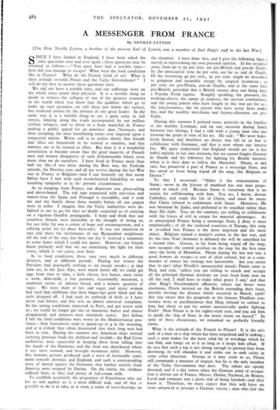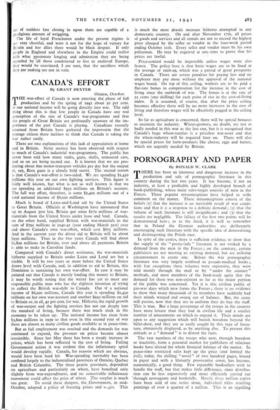A MESSENGER FROM FRANCE
By NEVILLE LITTON [The Hon. Neville Lytton, a brother of the present Earl of Lytton, was a member of Earl Haig's staff in the last War.]
SINCE I have landed in England, I have been asked the same questions over and over again ; these questions may be resumed as follows :—" You must have had a terrible time— how did you manage to escape? What were the food conditions like in France? What do the French think of us? What is their attitude towards Petain and the Vichy Government? " I will do my best to answer these questions here.
We did not have a terrible time, and our sufferings were on the whole more moral than physical. It is a terrible thing no doubt to witness the collapse of one of the greatest countries in the world when you know that the qualities which go to make up such greatness are still there just below the surface, but rendered useless by the absence of any great leader. In the same way it is a terrible thing to see a great army in full retreat, limping along the roads accompanied, by ten million civilian refugees, and to listen to a beau marechal de France making a public appeal for an armistice dans l'honneur, and then accepting the most humiliating terms ever imposed upon a conquered nation. Worse still is to realise slowly that friends and allies are henceforth to be treated as enemies, and that enemies are to be treated as allies. But then it is a wonderful consolation to become aware that the great majority of French men and women disapprove of such dishonourable felony even more than we do ourselves. I have lived in France more than half my life—I was there during the Boer war, the Fashoda episode, the Dreyfus case, and all my service during the last War was in France or Belgium—and I can honestly say that never before have I met with such warm-hearted friendship or such touching sympathy as in the present circumstances.
As to escaping from France, our departure was plain-sailing and above-board. The red tape connected with exit-visas and transit-visas for Spain and Portugal is incredible, and it took me and my family about three months before all our papers were in order. I imagine that the Vichy authorities were de- lighted to see us go, for they no doubt suspected us of carrying on a vigorous Gaullist propaganda. I hope and think that our countless friends were miserable at the thought of losing us, for our little flat was a centre of hope and encouragement, and a rallying point for les times bien-nies. It was our intention to stay and share the misfortunes of our Burgundian neighbours till the end of the war, but then one day I ;eceived a summons to come home which I could not ignore. However, our friends know perfectly well that we are continuing the fight for their cause, which is our cause, over here.
As to food conditions, these vary very much in different districts, and at different periods. During last winter the Parisians had practically nothing to eat except swedes ; at that time we, in the Jura Alps, were much better off; we could get eggs from time to time, a little cheese, less butter, meat twice a week, skim-milk, a few potatoes, occasionally macaroni, a moderate ration of inferior bread, and a minute quantity of sugar. We were short of fats and sugar, and many women had such bad chilblains that their finger-tips grew black and the nails dropped off. I had such an outbreak of boils as I have never had before, and this was an almost universal complaint. In the spring conditions improved in Paris, and got worse with us ; we could no longer get rice or macaroni, butter and cheese disappeared, and potatoes were extremely scarce. Just before I left the food conditions were worse in the Mediterranean pro- vinces ; here housewives used to queue-up at 4 in the morning, and at 9 o'clock they often discovered that their long wait had been in vain. During the summer two American ships arrived carrying precious foods for children and invalids ; the Red Cross authorities were successful in keeping these from falling into the hands of the Germans, and the food was distributed where it was most wanted, and brought enormous relief. However, this humane gesture produced such a wave of favourable senti- ment towards America and England, and such a corresponding wave of hatred against the Germans, that further arrivals from America were stopped by Darlan. On the whole, the children suffered least, as they had plenty of full-cream milk.
To establish accurately the proportion of Frenchmen who are for us and against us is a most difficult task, and all that is possible to do is to take, as it were, a series of cross-bearings on
the situation. I have done this, and I give the following figures merely as representing my own personal opinion. In the occupied zone, from 90 to 95 per cent. are pro-British and pro-de Gaulle. In the unoccupied zone 6o per cent.- are for us and de Gaulle. Of the remaining 4o per cent., 20 per cent. might be described as gangrene and incurable except by surgical treatment ; zo per cent. are pro-Petain, anti-de Gaulle, and at the same time pro-British, provided that a British victory does not bring back a Popular Front regime. Roughly speaking, the peasants, the working-classes, the camps de jeunesse, the anciens combattants, and the young priests who have fought in this war are for us ; the fonctionnaires, the fat priests who have never been under fire, and the wealthy merchants and factory-directors, are pro- Vichy.
During this summer I painted many portraits in the families of the wealthy Lyonnais, and on one occasion during lunch between two sittings, I had a talk with a young man who put forward the point of view of his set. He said: " We were hope- lessly beaten, and therefore no choice was left to us but to collaborate with Germany, and that is now where our interest lies. We quite understand that England should act (as is her habit) entirely in her own interests, but we cannot forgive General de Gaulle and his followers for fighting for British interests when it is their duty to follow the Marechal. Petain, at any rate, has preserved a part of France as a sovereign State, and has saved us from being wiped off the map, like Belgium or Greece."
To that I answered: " Hitler is the reincarnation of Satan ; never in the history of mankind has one man perpe- trated so much evil. Because Satan is victorious that is no reason for collaborating with him. You are, I know, devout Catholics, and study the life of Christ, and must be aware that Christ refused to collaborate with Satan. Moreover, He was betrayed by Judas, and preferred to be crucified rather than deny His faith. You, on the contrary, are willing to collaborate with the forces of evil in return for material advantages. As to unoccupied France being a sovereign State, j.. deny it most emphatically ; of all the enslaved countries of Europe, this strip of so-called free France is the most impotent and the most abject. Belgium earned a martyr's crown in the last war, and by the time Nazi Germany is defeated she will be sanctified for a second time. Greece, so far from being wiped off the map, now occupies the central position on the map for the first time since the battle of Marathon. Petain during the last war was a good homme de troupe—a sort of ideal colonel, but as a com- mander of armies his strategy was lamentable. Are you aware that in 1917 (after Nivelle's unsuccessful attack) Petain came to Haig and said, ' unless you are willing to attack and occupy all the principal German divisions on your front from now on till the end, I shall have to make what peace I can,' and that after Haig's Passchendaele offensive, where our losses were enormous, Petain insisted on the British extending their front, thereby inviting the disaster which occurred in March, 1918? Are you-aware that his proposals at the famous Doullens con- ference were so pusillanimous that Haig refused to submit to him, but chose to put his armies unreservedly under fighting Foch? Now Petain is in his eighty-sixth year, and you ask Mtn to guide the chip of State in the worst storm on record." In spite of these discussions, we remained on perfectly friendly terms.
What is the attitude of the French to Petain? It is the atti- tude of a man on a ship which has been torpedoed and is sinking ; such a man makes for the most solid bit of wreckage which he can find, and hangs on to it so long as it keeps him afloat. If he sees that such a log is not strong enough to prevent him from drowning, he will abandon it and strike out to seek safety in some other direction. Strange at it may seem to us, Petain still commands a measure of respect, but he is the only member of the Vichy Government that does. The others are openly detested, and if a day comes when the German army of occupa- tion is driven out of France, Messrs. Darlan, Pucheux, de Brinon, . Laval and company run a grave risk of being lynched—and they know it. Therefore, we must expect that they will leave no stone unturnzd to procure a German victory ; men who feel the net of ruthless fate closing in upon them are capable of a prodigious amount of wriggling.
The life of loyal Frenchmen under the present regime is not very cheerful, and were it not for the hope of victory for Britain and her allies there would be black despair. If only people in England and elsewhere in the Empire could realise with what p,assionate longing and admiration they are being regarded by all those condemned to live in enslaved Europe, they would be convinced, I am sure, that the sacrifices which they are making are not in vain.



























 Previous page
Previous page